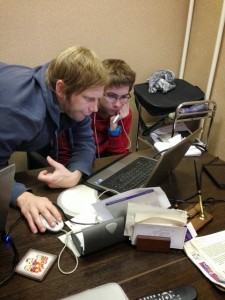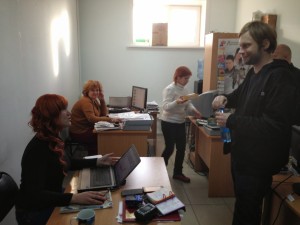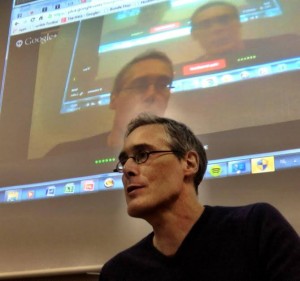Should a newsroom be totally open? As in ‘tell everyone in real-time what you’re discussing and doing’? I don’t think so. Investigative reporting for instance needs discretion, and sources do not always want to be in the open. However, there are also less convincing reasons for keeping the doors – physically and virtually – closed, such as ‘we can’t let the competition know what we’re planning’. In general, I believe newsrooms should be far more open than they are now.
Why? Because right now, people don’t trust journalists. Whether it’s in Russia or in the United States, media are regarded with suspicion. What are the hidden agendas? How independent are newsrooms? Telling the world ‘outside’ about news projects, from the very beginning (even right from the brainstorming phase) can improve the reputation of news services.
It’s not just a reputation issue. A lot of innovation in countless industries is taking place at the intersection of the digital and the physical world. It’s in that ‘mixed reality’ that journalists can experiment with crowdsourcing, data-gathering, networking with external coders etc. Having a more open newsroom facilitates all that.
The New Journalist’s Full Circle presentation I included in a previous blogpost points out in some detail which tools to use and which methodology to follow in order to benefit from an Open Newsroom approach.
The Eurasia Foundation gave me the opportunity to discuss these ideas with journalists in Russia. I worked with a local newspaper in Siberia, Kurer-Sreda, which reports diligently about local news in Berdsk.
The journalists had a very natural reaction when I presented the Full Circle tools: they pick and choose. They won’t use that particular social bookmark tool, but they will consider using some visualization tool or maybe some chat and video-streaming tools. I get the same reaction in my own newsroom and during other workshops.
It’s totally okay to pick and choose, and in the Russian case there is an additional element: it simply isn’t true that English is universally spoken. Non-Russian interfaces can be a considerable hurdle. Furthermore, Facebook and Google are global companies, but in huge countries such as Russia there are strong local competitors: VKontakte is an alternative for Facebook and Yandex beats Google in Russia. Which is an additional complication if you want to introduce people to stuff such as Google Hangout On Air.
However, the specific tools are not crucial. What is most important is the philosophy. There are many tools out there for organizing public collaborative mind maps, social media radars, forums, blogs and online discussions. What is most needed is the change of mentality, away from private note-taking and brainstorming behind closed doors. Newsrooms should embrace the sharing of ideas and resources. Journalists can try this out for specific projects but my real hope is that they will embrace it for the daily newsroom activities, by default livestreaming their deliberations and information gathering and only closing the doors in order to protect sources and delicate aspects of investigative work.





I have many problems with the Open Newsroom concept. For one, it’s not really open — it’s not visible to the public, and it’s by membership invitation only, at least the one on G+ that I was invited to.
I think there’s good reason to limit the membership to only those actually doing journalism so it doesn’t fill up with truthers and birthers and dopers, but then stop calling it the greatest open thing since creamed cheese, it’s not.
Second, I’m a big believer in not being so open your brains fall out. Naturally, you don’t want to post on ON every single lead that comes across your desk and which you pursue and every thought you have, not only because of the rampant problem of copying without credit on your open Internet, but because stuff isn’t baked yet and is still raw. The public is not “owed” the “right” to watch raw food being sliced and cooked. They can go open up their own damn newspaper if they need to do that. It’s a job, a hard job, and an occupation (not really a profession, although many think it is and have a high opinion of themselves as a result).
And here’s another big problem — secret police and state newspapers from oppressive countries that horn in, muddy the waters, lie, distract, and attack others getting at the truth. That is a REAL problem on this thing, believe me. And unfortunately, you openness brethren don’t have a basic concept of solidarity to say “We’re not going to include those people in our guild.” They should have such a rule. They don’t.
I could also point out that Russians are collectivists and collaborative by nature and culture more than Americans, but they also like to make little cells apart from others and keep others out. And they do this out of lack of trust and hatred of the other, and it’s a very hard thing to deal with in working in Russia. These crowdsource tools like the Ushahidi knock-off in Russia rapidly become run by cadres who filter stuff, make decisions behind closed doors and aren’t really open and collaborative. On the other hand, you have this terrible challenge in Russia of how to keep out the KGB/secret police and their informers who are way more represented in this society than in the West. There are constant provocateurs who heckle every democratic enterprise.
I fail to see why we “have” to have real-tim livestreamed deliberation by arrogant journalists who don’t let you add comments especally — or overrun the delicate work of journalists by looking over their shoulder. Why? Who says? Because of what?
There isn’t a rationale here except the cult-like embracing of “the new” and the “open” which is fake anyway, Roland, you know it and I know it. So own up to it. There can’t be “rules” to this. And it shouldn’t be merely about source protection or “delicacy” but getting work done. Sometimes, it’s best to work alone. It’s okay to be an indiviual and work alone. God put our brains in brain-pans precisely for that reason.